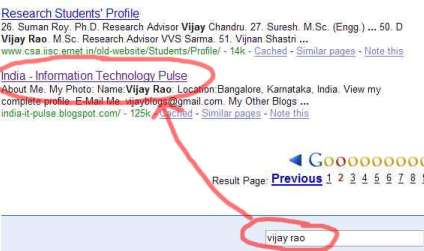Have a personal blog that helps you let out pent up emotions and feelings about friends, colleagues, your employer, your company, etc? Does your blog receive a hoard of visitors who want to see the latest of your damning revelations? Or on a more sober note, do you have strong opinions on subjects that the general public deems controversial? Ok..No blogs, but have you screamed off your viewpoints on public forums like blog comments, Google and Yahoo discussion groups or the latest social networking sites like Facebook, MySpace, Xanga, Orkut and Friendster? Well, maybe not a "Yes", but a "Ummmm...but that was just an off the cuff remark, buddy",you try to correct. In either case, you might have just dropped the stone on your feet.
and Yahoo discussion groups or the latest social networking sites like Facebook, MySpace, Xanga, Orkut and Friendster? Well, maybe not a "Yes", but a "Ummmm...but that was just an off the cuff remark, buddy",you try to correct. In either case, you might have just dropped the stone on your feet.
 and Yahoo discussion groups or the latest social networking sites like Facebook, MySpace, Xanga, Orkut and Friendster? Well, maybe not a "Yes", but a "Ummmm...but that was just an off the cuff remark, buddy",you try to correct. In either case, you might have just dropped the stone on your feet.
and Yahoo discussion groups or the latest social networking sites like Facebook, MySpace, Xanga, Orkut and Friendster? Well, maybe not a "Yes", but a "Ummmm...but that was just an off the cuff remark, buddy",you try to correct. In either case, you might have just dropped the stone on your feet.If one is to go by the reports on the Internet, one needs to be very concerned. Leaving footprints on the Internet is not without its pitfalls. Search engine technologies are delving more and more deeper into the Information haystack that is the Internet. Google, Yahoo and MSN are ruling supreme and are rapidly closing the gap between desired results and actual results. Convergence in this direction means that search is taking on newer dimensions. Searches have grown from being mere information digging tools to being ones that are in tech terms called as "narcissistic searches" and "stalking searches".
Google Narcissist
Narcissistic searches are employed to find out about oneself on the Information Superhighway. Search engines provide endless opportunities for ego surfing. One just types his name and finds out how much the search engines know about him/her. Google Narcissists is the term coined to describe such people.
Google Stalker
Follow someone too closely and you could be accused of being a Google stalker. Who could probably be a Google stalker? Probably somebody envious of you....may be. However the startling answer that can catch a netizen off guard is "Companies".

Companies Google for their Benefit
With rising jobs opportunities and a shortfall in supply of quality talent, Indian companies are faced
 with the humongous task of separating the grain from the chaff, the real men from adventurers who would never hesitate to fake experience and skills on their CVs. Indian companies had been all along using the assistance of self maintained databases and consultants to do a background check. Now they have added one more weapon to their armory. Search Engines. Human resource personnel in Indian companies are performing background profile checks of potential candidates and job seekers by running queries against their names on Google, Yahoo and MSN. Employees fare no better. Googling people is becoming a way for bosses and headhunters to do continuous and stealthy background checks on employees, no disclosure required. It also helps them aggregate data that is legally off-limits for companies during interviews like your age, your martial status, the value of your house (along with an aerial photograph of it), the average net worth of your neighbors, fraternity pranks, stuff you wrote in college, liens, bankruptcies, political affiliations, and the names and ages of your children.
with the humongous task of separating the grain from the chaff, the real men from adventurers who would never hesitate to fake experience and skills on their CVs. Indian companies had been all along using the assistance of self maintained databases and consultants to do a background check. Now they have added one more weapon to their armory. Search Engines. Human resource personnel in Indian companies are performing background profile checks of potential candidates and job seekers by running queries against their names on Google, Yahoo and MSN. Employees fare no better. Googling people is becoming a way for bosses and headhunters to do continuous and stealthy background checks on employees, no disclosure required. It also helps them aggregate data that is legally off-limits for companies during interviews like your age, your martial status, the value of your house (along with an aerial photograph of it), the average net worth of your neighbors, fraternity pranks, stuff you wrote in college, liens, bankruptcies, political affiliations, and the names and ages of your children.Michelle Conlin in the Business Week Online gives a scenario analysis of the dual life most netizens lead.
"There's the analog, warm-blooded version: the person who presses flesh at business conferences and interprets the corporate kabuki in meetings. Then there's the online you, your digital doppelganger; that's the one that is growing larger and more impossible to control every day."
The Indian Scenario
DNA India too has interesting quotes from two of India's top managers who swear by blogs to run their background checks.
Deepak Ghaisas, chairman of I-Flex Solutions, opines
"Blogs are written by people for public consumption. They are a good psychology test of the candidate. Around two to three articles in the blog subscribing to a particular trend/behaviour should be noticed."
For Mahesh Murthy, CEO of Pinstorm, checking employees’ blogs is a routine, both before and after hiring them. He says,
"Of my 50 employees, 10 have their own blogs which I regularly read. When I found two of them fighting through blogs I stepped in to make peace"
Horror stories abound on how people were asked to log out of companies after revelations by Google about stuff they did, which their companies couldn't digest. The classic case of Josh Santengelo, the famed web developer who was embarrassed when a search by his company on Google revealed not just his past accomplishments but also the honest revelations of his drug ridden past that he happened to jot down on the comments page of a blog. A case closer to home is that of Gaurav Sabnis who maintains the famed blog, Vantage Point. His personal comments on IIPM, a management institute in India caught him on the wrong foot with his employer IBM. The case turned ugly with IIPM students union handing out a deadline to IBM with a threat to burn up of all IBM-Lenovo laptops provided by IBM to the institute, unless action was initiated against Gaurav. Matters turned sore and Gaurav claims on his blog to have resigned from the job himself. As the dust settles down on this one, it is the unfortunate manner in which personal viewpoints published over the Internet come back to bite when one airs his/her views uninhibitedly and without exercising caution on the Web, that must be focused upon.
This kind of a eventuality is being forced upon many a individual, that English language has a new verb "dooced" to refer to people who have lost jobs because of what they published over the Internet. The name comes from Dooce.com, the blog of a certain Heather B. Armstrong, who got canned after writing about her job on her blog.
Dooced definitely does not sound great if companies start mentioning about it in relieving letters, does it? So tread cautiously out there... You might unknowingly set off a timebomb against your name even without knowing it.
Comments
Hmm I need to be careful. I may get good impression from Orkut and Opera, if they google by my name and my blog, but I will have a real hard time with Wendys! :))